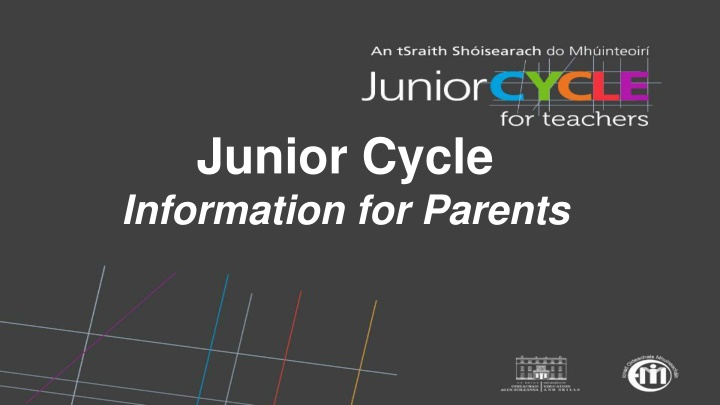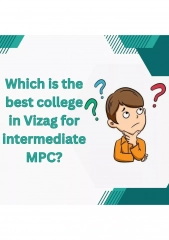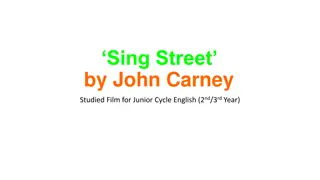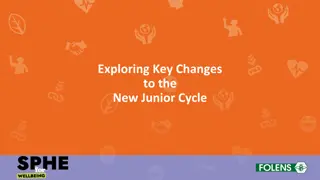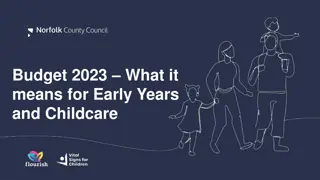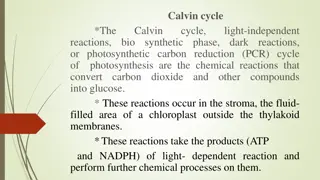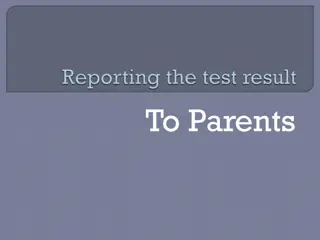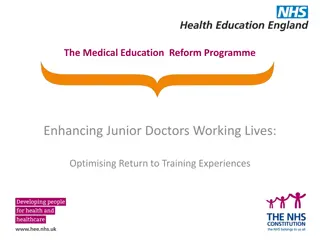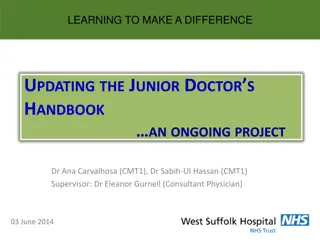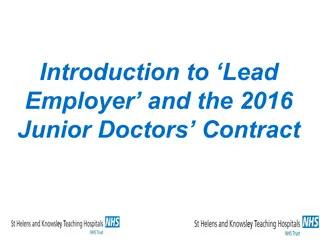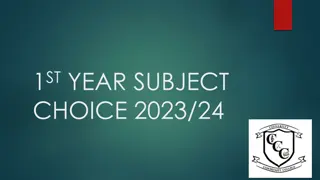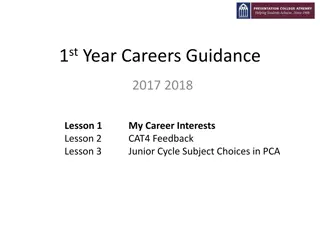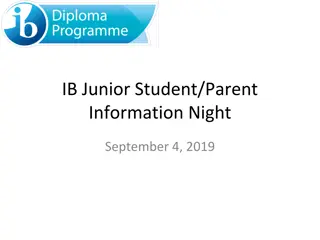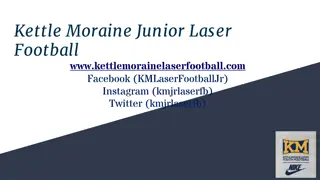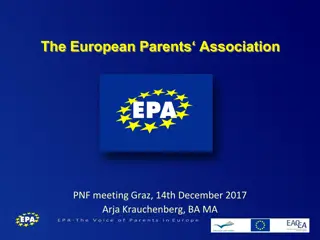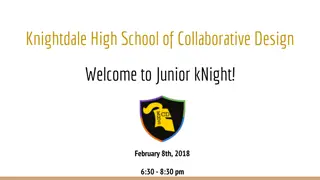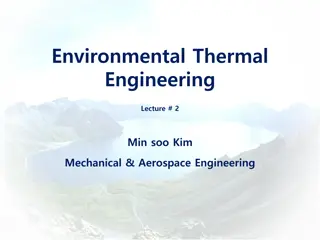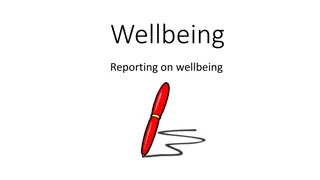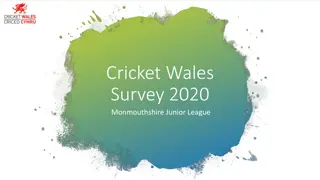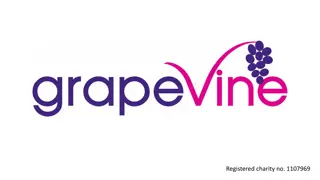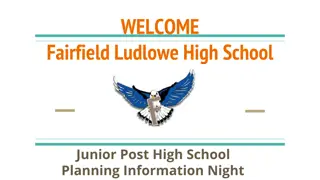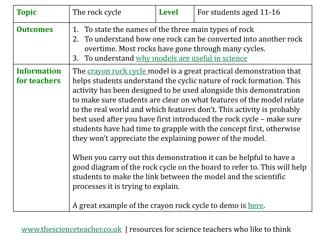Junior Cycle Information for Parents - Overview of Changes in Education System
The Junior Cycle in Ireland has undergone significant changes to shift focus from content-based learning to skill development. The revamped curriculum includes subjects, short courses, and emphasizes student well-being. Assessment methods have been updated, moving away from traditional exams. This informative guide outlines the rationale for change, the structure of the new cycle, and details on assessment and reporting. Parents can gain insights into the curriculum, key skills, and principles to better understand their child's educational journey.
Download Presentation

Please find below an Image/Link to download the presentation.
The content on the website is provided AS IS for your information and personal use only. It may not be sold, licensed, or shared on other websites without obtaining consent from the author.If you encounter any issues during the download, it is possible that the publisher has removed the file from their server.
You are allowed to download the files provided on this website for personal or commercial use, subject to the condition that they are used lawfully. All files are the property of their respective owners.
The content on the website is provided AS IS for your information and personal use only. It may not be sold, licensed, or shared on other websites without obtaining consent from the author.
E N D
Presentation Transcript
Junior Cycle Information for Parents Click Title
Overview 1. Why change was needed at Junior Cycle? 2. Structure of the Junior Cycle - Subjects - Short Courses - Wellbeing 3. Assessment - Classroom Based Assessments - Examinations - Junior Cycle Profile of Achievement (JCPA)
1. Rationale For Change The Junior Cert exam was dominating teaching and learning in many Irish classrooms. There was too much emphasis on covering content / knowledge. Over emphasis on rote learning. Limited emphasis on skills.
2. Structure of the Junior Cycle Assessment and Reporting Level 2 Learning Programmes Short Courses Other Areas of Learning Subjects Wellbeing C U R R I C U L U M 8 Key Skills 24 Statements of Learning 8 Principles
Junior Cycle Programme at St Raphaels First year classes 2020 / 2021 Ten Subjects Reduced to nine next year. Three Short Courses P.E., S.P.H.E. and C.S.P.E. (Wellbeing)
Wellbeing Physical Education (Two class periods) Social, Personal and Health Education SPHE - (Two class periods) Civic, Social and Political Education CSPE - (Two class periods) - Settling In / Being Organised - Resilience - Meditation and Mindfulness - Healthy Eating and Activity - Cyber Safety - Study Skills. Wellbeing Class (One Class)
Assessment Exams will be set and marked by the State Examinations Commission. English, Irish and Maths at Higher and Ordinary level. All other subjects are specified at a common level. Exam Duration Two Hours.
Descriptors The state examination that students sit at the end of their junior cycle will also be graded differently. Instead of the traditional A , B , C grades the following descriptors will now be used: Distinction: 90% - 100% Higher Merit: 75% - 89% Merit: 55% - 74% Achieved: 40% - 54% Partially Achieved 20% - 39%
Classroom Based Assessments (CBAs) CBAs will be completed by students in each subject and short course. CBAs aim to create opportunities for students to demonstrate their learning in areas that are difficult to capture in a timed pen and paper exam. Second Year (CBA 1) 12 Third Year (CBA 2) 9. CBA schedule.
Classroom Based Assessments CBAs will be assessed using the following descriptors: Exceptional Above Expectations In Line with Expectations Yet to Meet Expectations After completing CBA2 students will sit an Assessment Task in each subject. This is an exam over two class periods, supervised by teachers and corrected by the State Exams Commission. It is worth 10% of the final exam.
Recap - Assessment Students will study nine subjects. Students will sit nine two hour exams in June 2023. Twenty-one Classroom Based Assessments . Nine Assessment Tasks.
Your son / daughter will be involved in Reviewing feedback and identifying what they have done well. Identifying what to do next. Setting and achieving personal goals. Redrafting and correcting their own work. Giving feedback to others. Considering examples of good work and identifying how they can improve on their own work . Undertaking research based homework.
Junior Cycle Profile of Achievement Students will receive a new Junior Cycle Profile of Achievement (JCPA). This will report on the following: Subjects CBAs Short Courses Wellbeing Other Areas of Learning
Other Areas of Learning The school has flexibility to report on other learning experiences that students have participated in outside the formal timetabled curriculum. Sporting activities, student council, Green schools programme, BT Young Scientist competition, fundraising ..
Useful Websites www.curriculumonline.ie www.jct.ie
